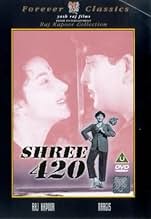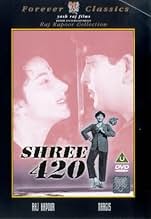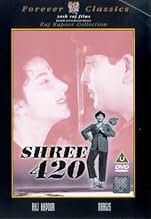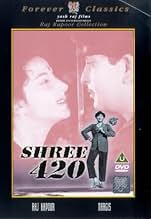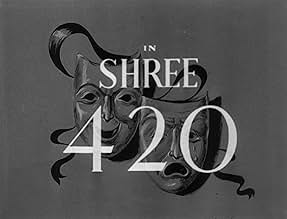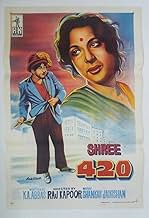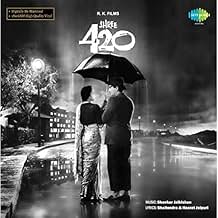IMDb-BEWERTUNG
7,9/10
3209
IHRE BEWERTUNG
Raj fällt einem unethischen Lebensstil zum Opfer, als ihn ein reicher Geschäftsmann, Sonachand, dazu lockt. Als Raj jedoch Sonachands skrupellose Wege erkennt, beschließt er, Abhilfe zu scha... Alles lesenRaj fällt einem unethischen Lebensstil zum Opfer, als ihn ein reicher Geschäftsmann, Sonachand, dazu lockt. Als Raj jedoch Sonachands skrupellose Wege erkennt, beschließt er, Abhilfe zu schaffen.Raj fällt einem unethischen Lebensstil zum Opfer, als ihn ein reicher Geschäftsmann, Sonachand, dazu lockt. Als Raj jedoch Sonachands skrupellose Wege erkennt, beschließt er, Abhilfe zu schaffen.
- Auszeichnungen
- 3 wins total
Empfohlene Bewertungen
Raj Kapoor's social dramedy "Shree 420" is a real classic gem. I have rarely seen a film that is as entertaining, inspiring, eye-opening, and affecting all at the same time, as this one. Kapoor's character represents the common man who is lost in a world dominated by the rich and famous. This role, in an amazingly dizzy combination of comedy and drama, is unforgettable. He is sad, he is lonely, he does not know what the future plans for him, so he just prefers to forget it all, be cynical and laugh about his misery. He falls in love with a beautiful young woman called Vidya and wants to succeed on his own moral terms, but it's just impossible in a society so indifferent to human lives. After being introduced to the world of gamblers by a vulgar dancer named Maya where he can use his talent for card manipulation, he is aided by his tremendous skills to become part of exactly this corrupted society. When he wants to come back, it's perhaps too late. Such was the lot for simple people of that time.
Just like Kapoor's previous gem Awaara, Shree 420 brings together several genres, navigating between socio-realist drama, musical romance, and slapstick comedy, to explore themes of poverty, social classes, nationalism, multi-culturalism, dreams of socio-economic mobility in a world of opportunity, and urban loneliness in a city where modernity took over so much that everyone mind their own thing without minimal awareness of their surroundings. Clearly reflective of the early post-independence days in India, particularly in view of Nehruvian secular state socialism, the film manages to present the pros and cons of both capitalist and socialist economies, or the mix of the two, even though the direction in which hope for a better future lies in the eyes of the writer couldn't be clearer. Even though few rich people are shown to be kind - not money is the problem - elitism is. The film is above all a human, moral commentary on the many hypocrisies that underlie and sometimes govern life in developed societies, and it knows no country or time, as it's relevant always and everywhere.
Kapoor conveys the irony of the big city very well. Street beggars appear to have more knowledge in life than the so-called elite people; people sell more than they buy in order to survive the next couple of days, even if it means they have to cede their most precious assets; street dwellers feel they own these very streets just because that's where they sleep, and everyone is in search of money, because money runs the world. That's where Raj is thrown. He desperately needs money but he can't find a job despite his academic degree. This forces him to basically compromise his core values. But in doing so, you are a swindler and get branded "420" by the so-called reputable citizens, most of whom are mere phonies and are the real thieves of society, who try to turn the poor people into scapegoats so that they can hide their own crimes. The writing, by and large, courtesy the legendary Khwaja Ahmad Abbas, is stupendous, with deep, meaningful dialogue wavering between some welcome humour, casual everydayness, and often just sheer poetry.
The portrayal of life in urban Bombay of the 50s is admirably realistic and might catch many foreigners by surprise. Indeed, such life existed in India as well, for those ignorant of the diverse ways and cultures of this phenomenal country. Technically, the film is ahead of its times and it boasts of high production values. The costuming, sets, and the overall production design, are all excellent. The movie is just all style, while also being a slice-of-life glimpse into a place that feels so removed yet so familiar. The setting, ranging from crowded market centers or densely populated streets where the homeless stay, to shopping districts and empty rain-wet avenues, to the luxurious hotels and casinos, is spot on; and the camera work secures a true visual treat. Even a small antique shop, a portion of Chowpatty beach at the coast of the city, a small house or a tea stall, are wonderfully presented. The black-and-white cinematography is, indeed, a true asset in this film, as it enhances the narrative and gives tremendous importance to the characters and their situation.
Kapoor makes a fantastic job in terms of acting and directing. As a director, his attention to detail helps the story receive the credibility it requires. As an actor, he delivers a terrific performance, capturing both the famous Chaplinesque persona but also the person beneath it. His comic timing is top-notch, his pain is well evident, and he makes his character's transformation from a simpleton to a sophisticated gambler cum serious and unhappy businessman brilliantly. Nargis, as his beloved Vidya, is just splendid. She is presented as the epitome of Indian female goodness, inner beauty, and purity. A superb actress by every possible standard of judgement, she is incredibly graceful, natural and believable. Note the scene when Vidya visits the casino along with Raj and is publicly humiliated by Nadira's Maya. She starts crying quietly and ashamedly, while Raj is looking at her, unable to say a word. It's a wonderful scene, brilliantly acted and executed. It goes without saying that Kapoor and Nargis had the most powerful on-screen chemistry of their time.
The cast includes a host of great character actors enacting their parts with conviction. The glorious Lalita Pawar stands out as Gangamai, a lovable woman who is a mother figure to the entire street and to Raj in particular. Pawar exudes a warmth that makes it easy to understand why she is so loved by the people in the movie, and her interaction with Raj is very well portrayed. This is one of the famous roles of Nadira, and she really does a good job as Maya, the polar opposite of Vidya (also in their symbolic names). Her vicious expressions, sharp line delivery and the way she stylishly smoke her cigarettes in a holder, created the ultimate vamp of the times, reminiscent of some of the characters played by Bette Davis. Nemo is also very well cast as Sonachand Dharmanand, a sort of comic villain. Hari Shivdasani is excellent as Vidya's kindhearted father. Shree 420 is generally tremendously well-acted by one and all. Even the tiniest minuscule characters appear natural and authentic, and some of them, such as the seller or the street beggar, are totally memorable.
And if all that wasn't enough, the film has among the most beautiful soundtracks of Indian cinema. Composed by Shankar-Jaikishan, it is considered to be an all-time classic, and rightfully so. Apart from the movie's signature song "Mere Joota Hai Japani", my favourite numbers are "Pyar Hua Ikrar Hua" and "Ramaiya Vastavaiya" which are not only melodious and memorable but also very beautifully pictured in the film, efficiently representing the contradictory moods and states of mind of the lead pair. The former shows their dreams and hopes of forming a happy family life together, and the latter presents their sadness and loneliness on parted ways, while in the backdrop the street people are singing and dancing, still holding hope for a better day. I cannot forget the heartbreaking moment showing Nargis's Vidya sitting serenely and teary-eyed on her home's pavement, softly singing the poignant lines of the song. At the same time it shows Kapoor's pain of losing his own self upon watching his old friends, yearning to come back to his previous, poor but happy life.
That was Kapoor's way of perceiving the art of cinema and life in general, I believe. Through this movie and his character he shows us that laughing at yourself, making fun of common social diseases, switching masks from sad to happy and vice versa and sometimes even standing on your head in order to see this crazy world from a clearer perspective, is the best way to go. This is one of the aspects that make this film so thoroughly fascinating and entertaining, and apart from its socially relevant message, which feels fresh even today, it has a wide range of emotions and memorable moments which make it the heart-touching classic that it is. The ending is fantastic, ultimately showing us that it actually is possible to live a decent life and not lose yourself, and more than anything, change the world. "Shree 420" has it all, superb comedy, powerful drama, a strong social message, charming romance, great music. It is full of hope, love and optimism, and can be easily described as not only one of Raj Kapoor's best, but also one of Indian cinema's finest. Classic, world-class cinema, indeed.
Just like Kapoor's previous gem Awaara, Shree 420 brings together several genres, navigating between socio-realist drama, musical romance, and slapstick comedy, to explore themes of poverty, social classes, nationalism, multi-culturalism, dreams of socio-economic mobility in a world of opportunity, and urban loneliness in a city where modernity took over so much that everyone mind their own thing without minimal awareness of their surroundings. Clearly reflective of the early post-independence days in India, particularly in view of Nehruvian secular state socialism, the film manages to present the pros and cons of both capitalist and socialist economies, or the mix of the two, even though the direction in which hope for a better future lies in the eyes of the writer couldn't be clearer. Even though few rich people are shown to be kind - not money is the problem - elitism is. The film is above all a human, moral commentary on the many hypocrisies that underlie and sometimes govern life in developed societies, and it knows no country or time, as it's relevant always and everywhere.
Kapoor conveys the irony of the big city very well. Street beggars appear to have more knowledge in life than the so-called elite people; people sell more than they buy in order to survive the next couple of days, even if it means they have to cede their most precious assets; street dwellers feel they own these very streets just because that's where they sleep, and everyone is in search of money, because money runs the world. That's where Raj is thrown. He desperately needs money but he can't find a job despite his academic degree. This forces him to basically compromise his core values. But in doing so, you are a swindler and get branded "420" by the so-called reputable citizens, most of whom are mere phonies and are the real thieves of society, who try to turn the poor people into scapegoats so that they can hide their own crimes. The writing, by and large, courtesy the legendary Khwaja Ahmad Abbas, is stupendous, with deep, meaningful dialogue wavering between some welcome humour, casual everydayness, and often just sheer poetry.
The portrayal of life in urban Bombay of the 50s is admirably realistic and might catch many foreigners by surprise. Indeed, such life existed in India as well, for those ignorant of the diverse ways and cultures of this phenomenal country. Technically, the film is ahead of its times and it boasts of high production values. The costuming, sets, and the overall production design, are all excellent. The movie is just all style, while also being a slice-of-life glimpse into a place that feels so removed yet so familiar. The setting, ranging from crowded market centers or densely populated streets where the homeless stay, to shopping districts and empty rain-wet avenues, to the luxurious hotels and casinos, is spot on; and the camera work secures a true visual treat. Even a small antique shop, a portion of Chowpatty beach at the coast of the city, a small house or a tea stall, are wonderfully presented. The black-and-white cinematography is, indeed, a true asset in this film, as it enhances the narrative and gives tremendous importance to the characters and their situation.
Kapoor makes a fantastic job in terms of acting and directing. As a director, his attention to detail helps the story receive the credibility it requires. As an actor, he delivers a terrific performance, capturing both the famous Chaplinesque persona but also the person beneath it. His comic timing is top-notch, his pain is well evident, and he makes his character's transformation from a simpleton to a sophisticated gambler cum serious and unhappy businessman brilliantly. Nargis, as his beloved Vidya, is just splendid. She is presented as the epitome of Indian female goodness, inner beauty, and purity. A superb actress by every possible standard of judgement, she is incredibly graceful, natural and believable. Note the scene when Vidya visits the casino along with Raj and is publicly humiliated by Nadira's Maya. She starts crying quietly and ashamedly, while Raj is looking at her, unable to say a word. It's a wonderful scene, brilliantly acted and executed. It goes without saying that Kapoor and Nargis had the most powerful on-screen chemistry of their time.
The cast includes a host of great character actors enacting their parts with conviction. The glorious Lalita Pawar stands out as Gangamai, a lovable woman who is a mother figure to the entire street and to Raj in particular. Pawar exudes a warmth that makes it easy to understand why she is so loved by the people in the movie, and her interaction with Raj is very well portrayed. This is one of the famous roles of Nadira, and she really does a good job as Maya, the polar opposite of Vidya (also in their symbolic names). Her vicious expressions, sharp line delivery and the way she stylishly smoke her cigarettes in a holder, created the ultimate vamp of the times, reminiscent of some of the characters played by Bette Davis. Nemo is also very well cast as Sonachand Dharmanand, a sort of comic villain. Hari Shivdasani is excellent as Vidya's kindhearted father. Shree 420 is generally tremendously well-acted by one and all. Even the tiniest minuscule characters appear natural and authentic, and some of them, such as the seller or the street beggar, are totally memorable.
And if all that wasn't enough, the film has among the most beautiful soundtracks of Indian cinema. Composed by Shankar-Jaikishan, it is considered to be an all-time classic, and rightfully so. Apart from the movie's signature song "Mere Joota Hai Japani", my favourite numbers are "Pyar Hua Ikrar Hua" and "Ramaiya Vastavaiya" which are not only melodious and memorable but also very beautifully pictured in the film, efficiently representing the contradictory moods and states of mind of the lead pair. The former shows their dreams and hopes of forming a happy family life together, and the latter presents their sadness and loneliness on parted ways, while in the backdrop the street people are singing and dancing, still holding hope for a better day. I cannot forget the heartbreaking moment showing Nargis's Vidya sitting serenely and teary-eyed on her home's pavement, softly singing the poignant lines of the song. At the same time it shows Kapoor's pain of losing his own self upon watching his old friends, yearning to come back to his previous, poor but happy life.
That was Kapoor's way of perceiving the art of cinema and life in general, I believe. Through this movie and his character he shows us that laughing at yourself, making fun of common social diseases, switching masks from sad to happy and vice versa and sometimes even standing on your head in order to see this crazy world from a clearer perspective, is the best way to go. This is one of the aspects that make this film so thoroughly fascinating and entertaining, and apart from its socially relevant message, which feels fresh even today, it has a wide range of emotions and memorable moments which make it the heart-touching classic that it is. The ending is fantastic, ultimately showing us that it actually is possible to live a decent life and not lose yourself, and more than anything, change the world. "Shree 420" has it all, superb comedy, powerful drama, a strong social message, charming romance, great music. It is full of hope, love and optimism, and can be easily described as not only one of Raj Kapoor's best, but also one of Indian cinema's finest. Classic, world-class cinema, indeed.
Based on some Internet research on the best of Bollywood, and on a lifelong crush on Raj Kapoor's brother Shashi, this was the first Bollywood movie I sought out at an Indian video store, and it completely blew me away. If you want to start to get to know the greatness of this cultural tradition, this is a good place to start, and I recommend watching it thirty times. It is still my favorite after some months of searching out Bollywood classics.
This movie provides a sublime pathway to love of Bollywood; for one thing the music is completely enchanting, beginning with the first song, sung by Raj Kapoor in his role as a university- educated ("B.A. passed") young country fellow garbed as a hobo on his way to Bombay--he sings his song of the road about "My shoes are Japanese, my trousers are British, my red hat is Russian, but my heart is Indian" --Mera juta hai Japani, etc. I do not speak Hindi and I have had to memorize it. I think some westerners may believe that the music of Bollywood movies will be a stumbling-block, but see if you still think that after you see this one. The songs are compelling and varied, the lyrics elaborate story elements, with the additional pleasure of being Indian or non-Western or whatever in their sentiments. Raj Kapoor's brilliant physicality and body language alone make the movie a joy.
It also provides the pleasures of screen romance with powerful chemistry (between Raj Kapoor and the great star Nargis, his real life inspiration and beloved), and of movement into the nightclub world of the rich and glamorous, and the opportunity to see the spectacularly handsome Raj change from a foolish-acting tramp/clown to a worldly charmer in a dinner jacket (even though this spells temporary trouble for the forgotten and virtuous Nargis).
~Virginia
This movie provides a sublime pathway to love of Bollywood; for one thing the music is completely enchanting, beginning with the first song, sung by Raj Kapoor in his role as a university- educated ("B.A. passed") young country fellow garbed as a hobo on his way to Bombay--he sings his song of the road about "My shoes are Japanese, my trousers are British, my red hat is Russian, but my heart is Indian" --Mera juta hai Japani, etc. I do not speak Hindi and I have had to memorize it. I think some westerners may believe that the music of Bollywood movies will be a stumbling-block, but see if you still think that after you see this one. The songs are compelling and varied, the lyrics elaborate story elements, with the additional pleasure of being Indian or non-Western or whatever in their sentiments. Raj Kapoor's brilliant physicality and body language alone make the movie a joy.
It also provides the pleasures of screen romance with powerful chemistry (between Raj Kapoor and the great star Nargis, his real life inspiration and beloved), and of movement into the nightclub world of the rich and glamorous, and the opportunity to see the spectacularly handsome Raj change from a foolish-acting tramp/clown to a worldly charmer in a dinner jacket (even though this spells temporary trouble for the forgotten and virtuous Nargis).
~Virginia
This was a nice film with drama, music, romance and a message made by and starring Raj Kapoor at his peak. He again demonstrated his love of the visual Charlie Chaplin, along with facial similarities his politics were probably not too far removed either.
Jaunty orphan Ranbir Raj makes his way to Bombay to make his fortune, after encountering much human trickery ends up poor in money but rich in love. Reflecting the ups and downs are many good Jaikishan songs, especially Mera Joota Hai Japani and the relentless bouncy Ichak Dana Bichak Dana both sung by Mukesh. Nargis seldom looked lovelier, either when singing in the rain, or in the key emotional scene watching her ghostly version singing her true feelings to Raj. He took to a tuxedo much better than Chaplin did too! The sets were all (RK) studio bound, but were atmospherically displayed in the gleaming black and white.
Overall nothing too heavy but not totally inconsequential either, a perfect example of early Bollywood.
Jaunty orphan Ranbir Raj makes his way to Bombay to make his fortune, after encountering much human trickery ends up poor in money but rich in love. Reflecting the ups and downs are many good Jaikishan songs, especially Mera Joota Hai Japani and the relentless bouncy Ichak Dana Bichak Dana both sung by Mukesh. Nargis seldom looked lovelier, either when singing in the rain, or in the key emotional scene watching her ghostly version singing her true feelings to Raj. He took to a tuxedo much better than Chaplin did too! The sets were all (RK) studio bound, but were atmospherically displayed in the gleaming black and white.
Overall nothing too heavy but not totally inconsequential either, a perfect example of early Bollywood.
"Shree 420" is a classic Bollywood film directed by Raj Kapoor and released in 1955. Starring Raj Kapoor himself, the movie revolves around the story of a young man named Raj who comes to the big city of Bombay (now Mumbai) with dreams of success and wealth. However, he soon realizes that the city is filled with corruption and deceit.
The film addresses various social issues prevalent at the time, such as the exploitation of the poor by the rich and the lure of quick money. Raj Kapoor's character, Raj, represents the common man who is easily swayed by materialistic desires but eventually learns the importance of honesty and integrity.
Composed by Shankar-Jaikishan, with lyrics by Shailendra and Hasrat Jaipuri, the songs, including the iconic "Mera Joota Hai Japani" and "Pyaar Hua Ikraar Hua," have become timeless classics and continue to be loved by audiences even today.
Raj Kapoor's performance in the film is stellar, showcasing his versatility as an actor. He effortlessly portrays the transformation of his character from an innocent and naive young man to someone who becomes disillusioned with the city's corruption. Nargis, who plays Vidya, Raj's love interest, delivers a memorable performance as well, bringing depth and emotion to her character.
The screenplay of "Shree 420" effectively captures the contrasting elements of hope and despair, humor and tragedy, and romance and social commentary. Raj Kapoor's direction ensures a balanced narrative that keeps the audience engaged throughout.
The film's cinematography, though dated by today's standards, was groundbreaking for its time. It beautifully captures the essence of Bombay, showcasing both its vibrant streets and the stark reality of its slums.
Overall, "Shree 420" is a classic Bollywood film that combines elements of romance, drama, and social commentary. It remains relevant even after several decades, as its themes of greed, corruption, and the struggle for a better life still resonate with audiences today. The movie's memorable performances, outstanding music, and Raj Kapoor's directorial vision make it a must-watch for any fan of Indian cinema or those interested in exploring the golden era of Bollywood.
The film addresses various social issues prevalent at the time, such as the exploitation of the poor by the rich and the lure of quick money. Raj Kapoor's character, Raj, represents the common man who is easily swayed by materialistic desires but eventually learns the importance of honesty and integrity.
Composed by Shankar-Jaikishan, with lyrics by Shailendra and Hasrat Jaipuri, the songs, including the iconic "Mera Joota Hai Japani" and "Pyaar Hua Ikraar Hua," have become timeless classics and continue to be loved by audiences even today.
Raj Kapoor's performance in the film is stellar, showcasing his versatility as an actor. He effortlessly portrays the transformation of his character from an innocent and naive young man to someone who becomes disillusioned with the city's corruption. Nargis, who plays Vidya, Raj's love interest, delivers a memorable performance as well, bringing depth and emotion to her character.
The screenplay of "Shree 420" effectively captures the contrasting elements of hope and despair, humor and tragedy, and romance and social commentary. Raj Kapoor's direction ensures a balanced narrative that keeps the audience engaged throughout.
The film's cinematography, though dated by today's standards, was groundbreaking for its time. It beautifully captures the essence of Bombay, showcasing both its vibrant streets and the stark reality of its slums.
Overall, "Shree 420" is a classic Bollywood film that combines elements of romance, drama, and social commentary. It remains relevant even after several decades, as its themes of greed, corruption, and the struggle for a better life still resonate with audiences today. The movie's memorable performances, outstanding music, and Raj Kapoor's directorial vision make it a must-watch for any fan of Indian cinema or those interested in exploring the golden era of Bollywood.
Story: Good
The film centers on Raj Kapoor, a poor but educated orphan who comes to Bombay with dreams of success but fall in prey of unethical lifestyle.
The writer's narrative presents a scathing critique of societal norms through a socialist lens, portraying the wealthy as villainous and the poor as victims. The film tackles issues like elitism, the devaluation of education, and the destructive nature of gambling, delivering a powerful social commentary.
Screenplay: Gripping The screenplay will not let you bore. Every aspect of the screenplay was enjoyable.
Characters: Good Ranbir Raj / Rajkumar Saxena: He was poor who came to mumbai to earn living but soon realize that this city is not ethical and got influenced by rich lifestyle earned by unethical ways and gambling.
Vidya: She was the love intrest of raj. She was shown poor but very ethical & self respectful. She was the one who took raj to path of ethics.
Seth Sonachand Dharmanand: He was the popular rich businessman of the city. He was very selfish, unethical and evil. He earned his money by fooling other person. His character deserved more screen time.
Maya: She was mistress like lady of rich people. She herself was elitist & evil.
Rest characters had a small role.
Dialogues: Good
Performances: Phenomenal Raj kapoor: He had a inconsistent performance as he tried to copy Charlie Chaplin in some parts which seemed overacting otherwise had aced role. His dialogue delivery was superb.
Nargis: Next level performance by nargis. Her expressions enhanced every scenes. She was looking like a dream, very gorgeous.
Nadira: She did her part well as a evil lady.
Nemo: He did a good job.
Rest all actors had a small role.
Direction: Superb The director was clear about his narrative thus all the scenes were relevant.
Music and BGM: Iconic All songs were iconic & remembered till date. BGM was also best.
Production value: To the point
Editing: Good
Ideology: The writer's narrative embodies a socialist ideology, presenting a straightforward critique of societal ills. The wealthy are depicted as exploitative, utilizing unethical means to amass wealth, while the poor suffer as victims. The narrative also condemns vices like gambling and immoral profiteering. Furthermore, it critiques urban norms, including elitism, the devaluation of education, and the deplorable living conditions of the underprivileged.
Final verdict: The film had a perfect writing with impactful story, strong narrative, gripping screenplay, good character development & powerful dialogues married with phenomenal performances, superb direction and iconic songs. Overall a must watch blockbuster.
0.5- Story 1- Screenplay 1- Dialogues 0.5- Characters 1- Performances 1- Music and BGM 1- Direction 0.5- Production value 0.5- Editing.
The writer's narrative presents a scathing critique of societal norms through a socialist lens, portraying the wealthy as villainous and the poor as victims. The film tackles issues like elitism, the devaluation of education, and the destructive nature of gambling, delivering a powerful social commentary.
Screenplay: Gripping The screenplay will not let you bore. Every aspect of the screenplay was enjoyable.
Characters: Good Ranbir Raj / Rajkumar Saxena: He was poor who came to mumbai to earn living but soon realize that this city is not ethical and got influenced by rich lifestyle earned by unethical ways and gambling.
Vidya: She was the love intrest of raj. She was shown poor but very ethical & self respectful. She was the one who took raj to path of ethics.
Seth Sonachand Dharmanand: He was the popular rich businessman of the city. He was very selfish, unethical and evil. He earned his money by fooling other person. His character deserved more screen time.
Maya: She was mistress like lady of rich people. She herself was elitist & evil.
Rest characters had a small role.
Dialogues: Good
Performances: Phenomenal Raj kapoor: He had a inconsistent performance as he tried to copy Charlie Chaplin in some parts which seemed overacting otherwise had aced role. His dialogue delivery was superb.
Nargis: Next level performance by nargis. Her expressions enhanced every scenes. She was looking like a dream, very gorgeous.
Nadira: She did her part well as a evil lady.
Nemo: He did a good job.
Rest all actors had a small role.
Direction: Superb The director was clear about his narrative thus all the scenes were relevant.
Music and BGM: Iconic All songs were iconic & remembered till date. BGM was also best.
Production value: To the point
Editing: Good
Ideology: The writer's narrative embodies a socialist ideology, presenting a straightforward critique of societal ills. The wealthy are depicted as exploitative, utilizing unethical means to amass wealth, while the poor suffer as victims. The narrative also condemns vices like gambling and immoral profiteering. Furthermore, it critiques urban norms, including elitism, the devaluation of education, and the deplorable living conditions of the underprivileged.
Final verdict: The film had a perfect writing with impactful story, strong narrative, gripping screenplay, good character development & powerful dialogues married with phenomenal performances, superb direction and iconic songs. Overall a must watch blockbuster.
0.5- Story 1- Screenplay 1- Dialogues 0.5- Characters 1- Performances 1- Music and BGM 1- Direction 0.5- Production value 0.5- Editing.
Wusstest du schon
- WissenswertesThe song of this movie "Mera joota hai jaapani" is heard being played in the opening seen of Dead pool (2016).
- VerbindungenFeatured in Patthar Ke Phool (1991)
- SoundtracksMera Joota Hai Japani, Yeh Patloon Englishtani
Music by Shankarsingh Raghuwanshi & Jaikishan Dayabhai Panchal
Performed by Mukesh
Top-Auswahl
Melde dich zum Bewerten an und greife auf die Watchlist für personalisierte Empfehlungen zu.
- How long is Shree 420?Powered by Alexa
Details
- Laufzeit
- 2 Std. 48 Min.(168 min)
- Farbe
- Seitenverhältnis
- 1.37 : 1
Zu dieser Seite beitragen
Bearbeitung vorschlagen oder fehlenden Inhalt hinzufügen


